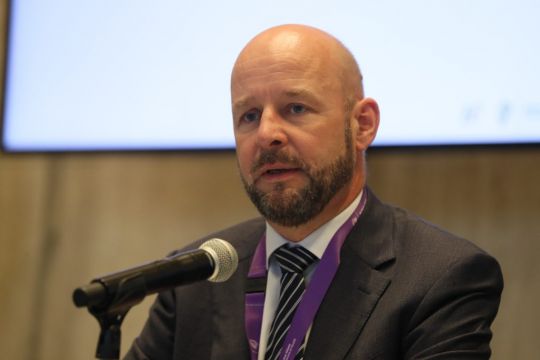The chair of the National Public Health Emergency Team's (Nphet) modelling advisory group, Professor Philip Nolan has said even “a marginal change in behaviour” would help bring the virus under control.
It was “not inevitable” that there would be 200,000 cases of Covid-19 in December as predicted in modelling, he told RTÉ Radio’s Morning Ireland. That would be the trajectory if nothing else changed, he explained.
Prof Nolan said everything was being done to try to avert a worst-case scenario of 450 people in intensive care by Christmas Day.
As of 8am on Thursday, the HSE confirmed there are 643 Covid patients in hospital today (the highest figure since February 24th), of which 119 are in ICU.
The latest modelling of SARS-CoV-2 infection in Ireland shows that we urgently need to reduce transmission if we are to avoid further dangerous increases in cases and hospitalisations. Stay home with symptoms, limit contacts, use basic mitigations. 1/20 pic.twitter.com/ahR6IKFeH0
— Professor Philip Nolan (@PhilipNolan_SFI) November 17, 2021
Advertisement
“We’ve had a very challenging few weeks,” he added. The midterm break in October had coincided with intense socialisation across all age groups, he explained, and there seemed to be a slightly lower level of cases this week, showing marginal changes could get the situation under control.
“We need to reduce our contacts and take mitigation measures,” Prof Nolan urged.
If someone has symptoms they should isolate and seek a PCR test, he said, adding that antigen tests were not a substitute for a PCR test, he warned.
Antigen tests were for “asymptomatic” close contacts of confirmed cases. There were no ‘good or bad’ tests, but antigen tests were only appropriate in some circumstances, he said.
When asked if the HSE moving fast enough on booster vaccines Prof Nolan said yes, urging that anyone who is offered the booster jab should take it immediately: “Do not delay, every day matters when you pass the five month (since second dose) threshold.”
Timing is everything and it was important to take the booster at the correct time - having it too early or too late could have an impact on its efficacy, he explained.
Cancer care
Menawhile, the chief executive of the Irish Cancer Society, Averil Power has called on the Government to “step up” and provide the capacity that the health service needs to combat Covid and maintain cancer services.
Speaking to the same programme, Ms Power said there was a high level of concern among cancer patients that they were now at greater risk of getting the virus because of high levels of transmission in the community.
Patients were afraid they were now more vulnerable and that the treatment may be delayed if they are infected. Hospitals were under pressure because of high Covid numbers and surgeries were being disrupted, she added.
Ms Power said it was “incredibly distressing” for patients, but the bigger issue was that surgeries were being cancelled because surgeons could not be guaranteed there would be an intensive care or high-dependency bed available after the operation. Such surgeries also required multi-disciplinary teams, many of whom were out of work at present because of illness or burnout, she added.
The @hpscireland has today been notified of 3,633* confirmed cases of #COVID19.
As of 8am today, 634 COVID-19 patients are hospitalised, of which 119 are in ICU.
*Daily case numbers may change due to future data validationAdvertisement— Department of Health (@roinnslainte) November 17, 2021
With cancer, timing is everything, and delays could make treatment more difficult and impact outcomes, Ms Power explained. Patients did not know how long their treatments were going to be delayed and that uncertainty was increasingly worrying, she said.
The Irish Cancer Society estimated that up to 2,000 cancer cases could have gone undiagnosed because of the pandemic.
Another issue Ms Power highlighted is the isolation being experienced by many cancer patients because of the pandemic, having to attend appointments alone which was very distressing, especially on occasions when they were given bad news.
“The Government needs to step up to provide the capacity that the health service needs.”
Ms Power also called on the public to continue to be vigilant – to get vaccinated and to wear masks to protect people “who need our help.”
“Let’s do everything we can to protect them,” she urged.
'Very far behind'
The concern regarding the situation in hospitals was echoed by intensive care consultant, Dr Andrew Westbrook, who warned the healthcare system “is nowhere near where it should be” in the middle of a pandemic in terms of bed capacity.
Dr Westbrook told Morning Ireland he was “deeply concerned” at the number of Covid cases in the community at present as, in the past, such figures had eventually translated into hospitalisations and intensive care.
Ireland was rapidly facing the situation where capacity would be exceeded, not just for ICU beds, but also for trained doctors and nurses, he added.
As far back as 2009 and 2012 reports had indicated that Ireland was 25th out of 31 countries when it came to bed capacity: “That’s pretty appalling,” Dr Westbrook said.
According to international standards Ireland should have 450-500 ICU beds, but capacity had increased only from 255 to 301 during the pandemic, he added.
“That’s nowhere near where we should be in the middle of a pandemic,” he said, adding the figures were “very far behind” where they should be even for normal admissions.
Dr Westbrook said Ireland was a wealthy, first world western democracy and should be able to provide a higher level of care for patients. He added the situation in hospitals and ICU units around the country at present was “pretty grim”, adding they are now seeing “a much sicker cohort of patients”.







